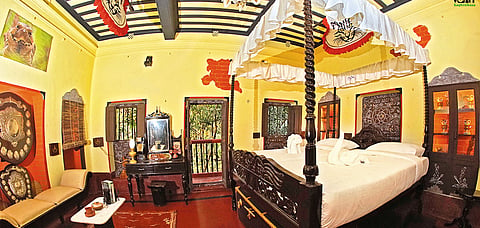

We had just sat down to a sumptuous Bengali meal when Shantanu Prasad and another naturalist hustled us outside. It was dark but the moonlight was bright enough to show us the way. We tagged behind our guides, trying our best to walk as noiselessly as possible. The naturalist pulled short behind a clump of trees and pointed towards the pond that lay beyond.
A fishing cat was standing in the shallow water near the bank. As our eyes adjusted to the faint light, we could make out the black spots on its body, its erect ears and its black spotted tail. It lunged forward, there was a splash and we saw its head popping out of the water&mdashpowerful jaws clamping on a large fish. In the twinkle of an eye, it disappeared into the bushes on the other side, dinner in mouth, a signal for us to return to ours. Dinner at Baghrol Basa that night stretched longer than usual as we listened to many tales of this elusive animal.

Tucked away inside Kalbaansh village in Howrah district of West Bengal, Baghrol Basa is a heritage homestay that is part of a larger ongoing conservation project involving the study and protection of the fishing cat (Prionailurus viverrinus) and its habitat.
Larger than a domestic cat, the fishing cat is distributed across parts of South and Southeast Asia, including India. However, the International Union for Conservation of Nature (IUCN), following its assessment in June 2016, categorised it as a &lsquovulnerable&rsquo species with a &lsquodeclining&rsquo population trend. Proliferation of urban and development, change in agriculture and aquaculture patterns, logging and fishing, wastewater runoffs, etc. are some of the key factors that are responsible for the declining trend globally.
Leaving our car in a field outside the village, we boarded a &lsquototo&rsquo sent to pick us up by the homestay. Located in the southern Bengal floodplains, Kalbaansh is a sprawling village marked by agricultural fields, fruit and other trees, and reed encircled ponds and lakes. During monsoon, the low-lying flat lands are often inundated by rain water, giving rise to patches of marshy areas.
It was while on a visit to this area that engineer-turned-wildlife researcher Shantanu, who already had an eco-tourism project going in the Darjeeling hills, realised that the locality seemed ideal for fishing cat habitat.
Inquiring among the villagers, he realised that the area supported a small population but man-animal conflict posed a threat to the cats. The animal, named after its favourite prey, was seen as a predator by the local people, to whom fishing in the mostly privately owned ponds, were a source of income.
&ldquoWe realised that unless we can show the villagers that the fishing cats are important,&rdquo said Shantanu, &ldquothey would not be interested in saving them.&rdquo
To start with, they decided to introduce eco-tourism in Kalbaansh village. Being acquainted with the local zamindar (landlord) family helped. He convinced the Ghosh family to convert a part of their nearly 300-year-old house into a heritage homestay.
Our vehicle stopped in front of a gate edged with the images of a pair of fishing cats. The fishing cat, which also happens to be the state animal of West Bengal, is called &lsquobaghrol&rsquo or &lsquomachh bagha&rsquo in Bengali. The theme ran through the entire homestay. Part of the greenery, especially around the ponds, had been allowed to grow wild while those around the garden path were neatly kept.

The Ghosh family home had been damaged to a large extent by a flood several years ago. However, Shantanu and his team decided to salvage what was left and add to it. The double-storeyed building consisted of two rooms on the first floor. One of the rooms was the spacious main bedroom, fronted by a verandah, and with the typical old style red oxide floor. It was part of the original building that was devastated by the flood. The vintage furniture, including a high four-poster bed, harked back to the olden times. A passage led to the second room which was styled like a mud hut with a thatched roof and eco-friendly décor, including bamboo furniture, hardened green coconuts used as bulb holders, etc. The sitting area attached to the mud hut overlooked the greenery below. It was here that we settled down for tea and Bengal&rsquos favourite snack, muri and tele-bhaja (puffed rice and vegetable fritters).

After a bit of rest, we decided to explore the grounds. According to members of Baghrol Basa, one can watch birds and butterflies in the premises.
Nearly 300 species of birds can be sighted in the area through all the seasons. If you are lucky you may also see monitor lizards and several kinds of snakes. There is a hide from where you can watch and photograph birds and animals without disturbing them. If you love angling, let the staff know and they will arrange everything at one of the ponds. In the middle of our sojourn, we were called for lunch at the ground floor dining hall.
The disappearance of the small animals, which call these floodplains home, is an indication the environment is going through a negative change. The fishing cat is the top predator in these areas. Besides eating fish, it also feeds on snakes, crabs, small birds and mammals. Killing them not only interferes with the food chain but also leads to proliferation of animals that may cause harm to crops.
Therefore, Shantanu and his team are actively trying to convince the villagers about the importance of preservation through awareness programmes. To compensate the villagers for the fish eaten by the &lsquopredators&rsquo, Shantanu and his team provide the cultivators with fingerlings for free, depending on the size of the pond. Part of the funds earned from the homestay are used for the conservation and awareness programmes.
